This week’s economic calendar may not be as packed with data, but it will feature a 20-year Treasury auction and a Q&A session with Jay Powell at the Economic Club of New York, just before the Federal Reserve’s blackout period begins on October 19th.
Market indicators suggest that the rate hike probability in November is quite low, at less than 10%, while the odds for a December rate hike are less than 40%. Given these numbers, making a public statement heading into the November Fed meeting might seem unnecessary, which makes this week’s appearance a bit odd.
Over the past week, various Federal Reserve officials have leaned towards the idea of no further rate hikes, a sentiment mirrored in the market. Powell has a history of stepping in to balance market sentiment. When sentiment becomes too hawkish, he provides a more dovish perspective, and vice versa.
At this juncture, the Federal Reserve would prefer to let the market take the lead. They recognize that the economy remains robust, making bringing inflation back to its target level challenging. Therefore, it would seem the Fed is looking to the longer end of the yield curve to help achieve its goals. This is because the Fed’s capacity to influence financial conditions by raising rates at the short end of the curve is limited compared to the impact of changes in rates at the longer end.
The impact of rising rates on the longer end of the curve on financial conditions isn’t solely dependent on the rates themselves; it also hinges on the spreads. Despite a significant increase in rates, financial conditions haven’t tightened significantly.
The Chicago Fed’s financial conditions index has barely risen. This could be attributed to the fact that credit spreads have only started to widen moderately. According to the Chicago Fed’s model, when the conditions line falls, it signifies easing, while a rising line indicates tightening.
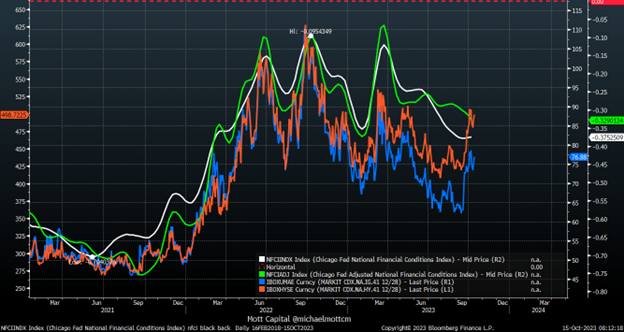
The Bloomberg Financial Conditions Index aligns with this assessment, indicating that conditions remain loose. A reading above zero suggests that conditions are currently accommodative to neutral regarding the state of the economy. In the Bloomberg model, a reading above zero signifies easing, while a reading below zero indicates tightening.
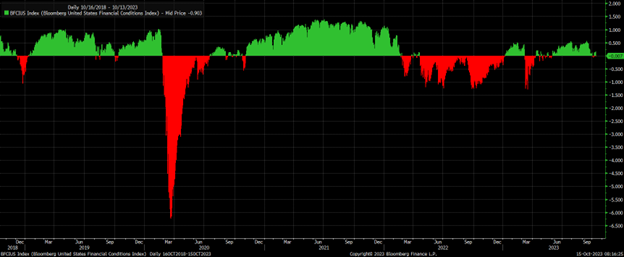
Given the current economic conditions, it would be prudent for Powell to maintain the ongoing trend of tightening financial conditions and avoid giving them room to ease, particularly in light of the recent hotter-than-expected Consumer Price Index (CPI) data for both month-on-month (m/m) and year-on-year (y/y) readings.
Furthermore, it’s worth noting that the super core CPI has shown consistent acceleration for three consecutive months, culminating in a 0.6% m/m increase in September. Powell’s approach should be to keep financial conditions on a tightening trajectory to help mitigate inflationary pressures.
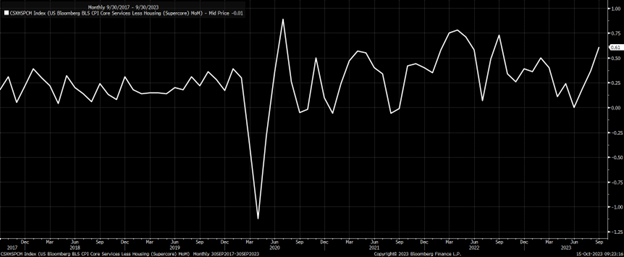
At this juncture, it seems crucial for Powell to maintain a hawkish tone, which doesn’t necessarily require him to threaten further rate hikes. Instead, he can reiterate the importance of keeping rates at a restrictive level for an extended period. Additionally, he could suggest that the neutral rate of the economy may now be higher than before the pandemic.
30-Year Rate Appears to Be Forming a Bull Flag Pattern
These measures should suffice to elevate rates on the curve’s longer end. Based on current chart patterns, it would be somewhat surprising to see the 30-year rate decrease, particularly following the weak Treasury auction performance last week. Presently, the 30-year rate appears to be forming a bull flag pattern, and if this analysis holds true, a move back above 4.8% could potentially lead to a retest of recent highs around 5.05% and, over time, even higher levels.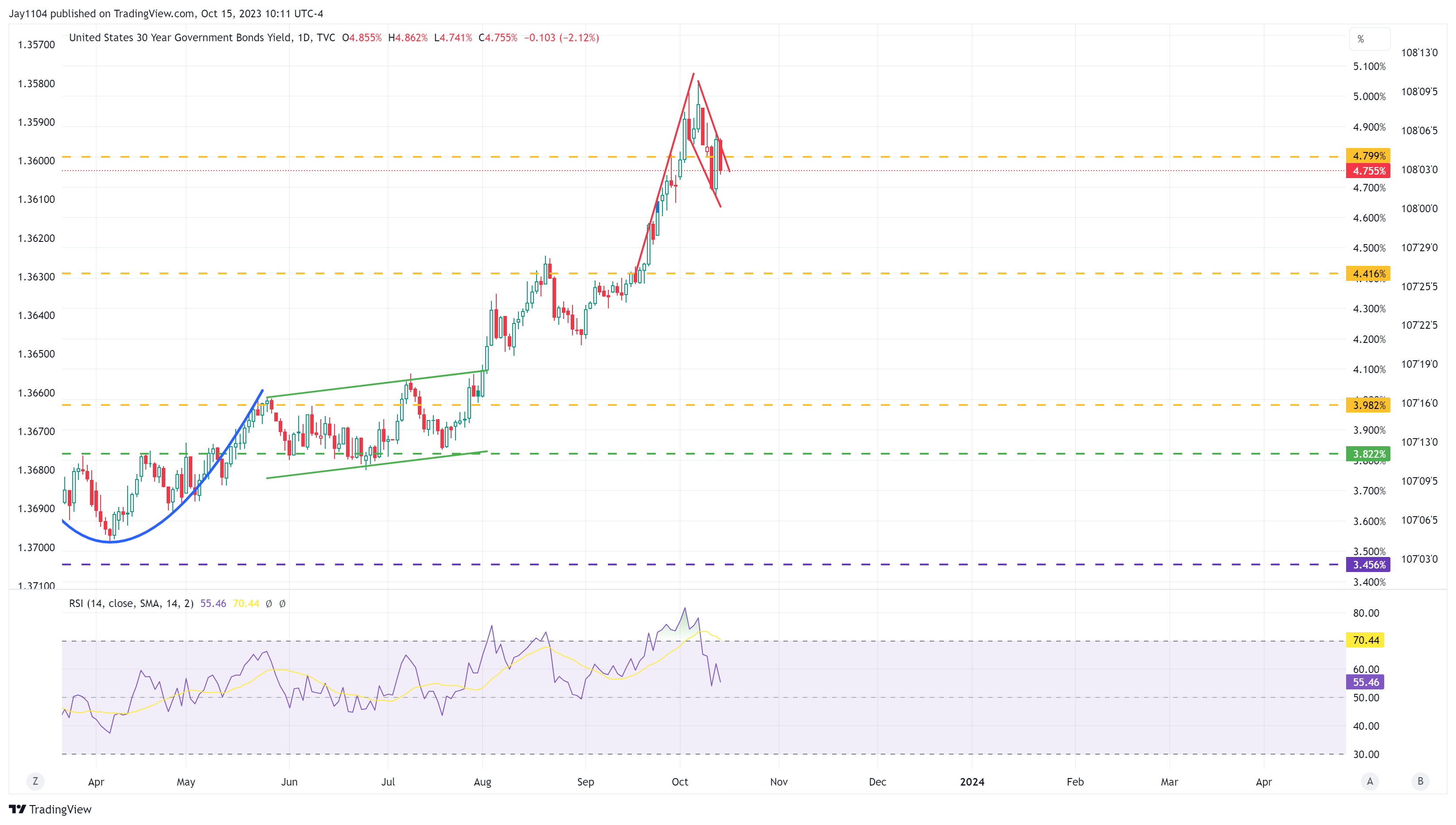
US Dollar Could Rally Further
The prospect of rising rates on the longer end of the yield curve will likely exert upward pressure on the Dollar Index, which has already broken free from a previous downtrend. This momentum could propel the Dollar Index to move higher, aiming for levels around 107.25 once again. This scenario aligns with the idea that rising interest rates can attract capital flows into a currency, driving its value upward.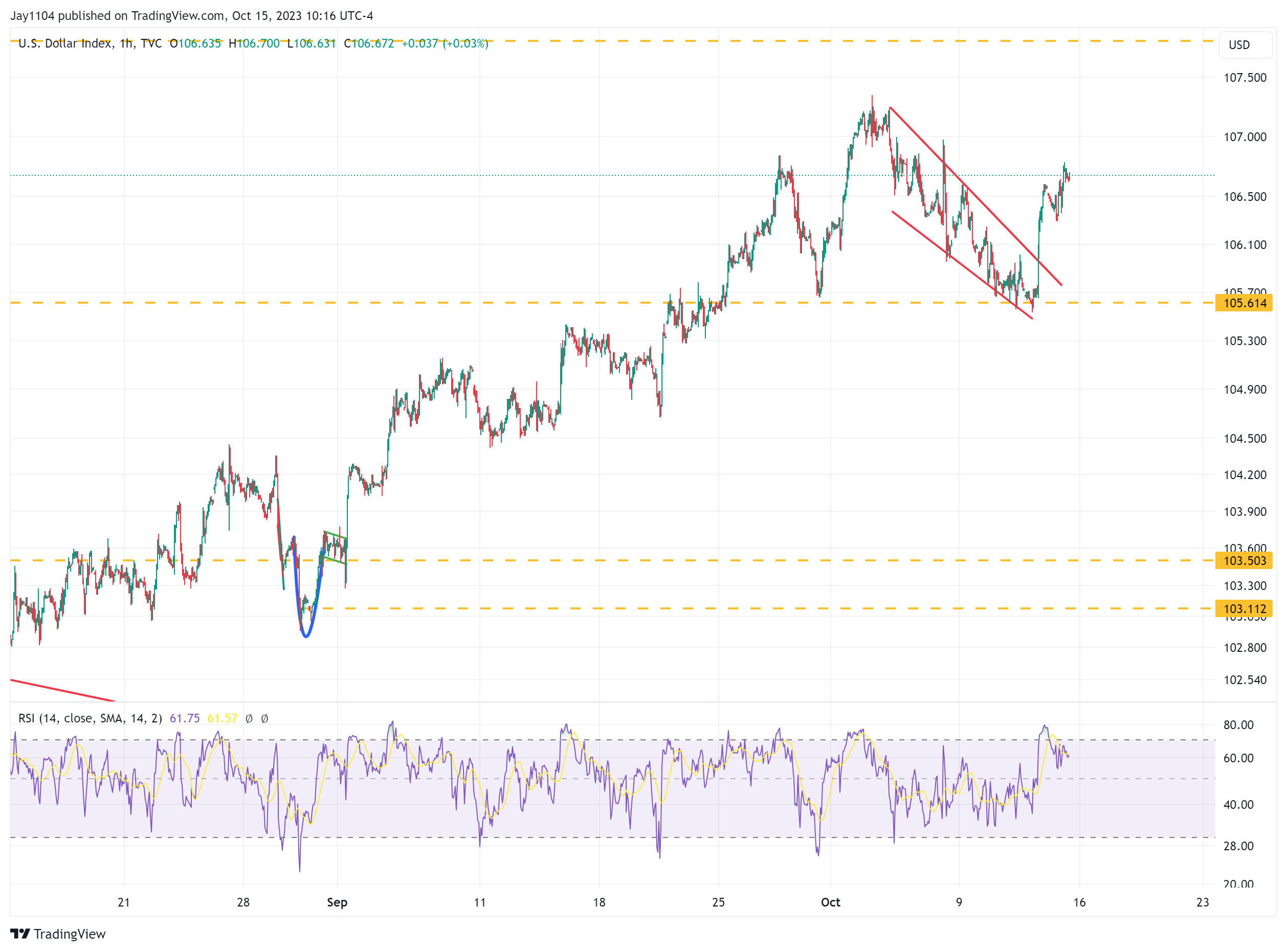
High Yield Spreads Under Pressure Amid Rising US Dollar
As rates rise and the dollar strengthens, it’s likely to pressure credit spreads, leading to widening spreads. This observation is supported by the upward trajectory of the Markit CDX HY Index, a key indicator for credit spreads in the high-yield bond market. Widening credit spreads typically reflect increased perceived risk in the credit markets and can affect corporate borrowing costs and investor sentiment.
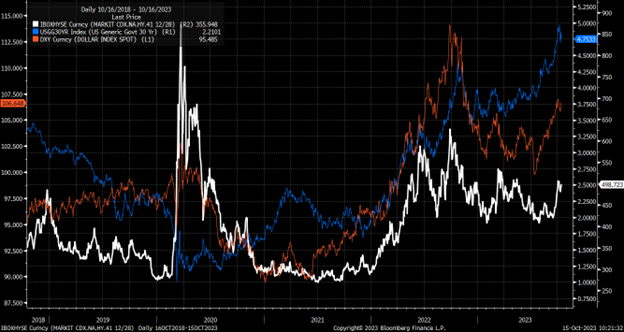
Notably, stocks have closely tracked movements in credit spreads for an extended period. As credit spreads widen, it raises the likelihood of downward pressure on stock prices. The relationship between the earnings yield of the S&P 500 and the CDX HY index has been tracking each other for some time.
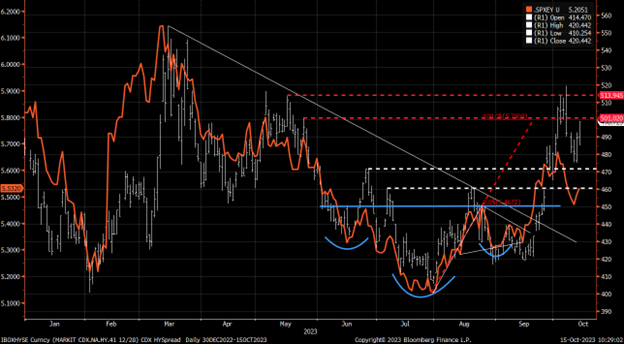
S&P 500 Earnings Yield Forming an Inverse H&S Pattern
It appears that the earnings yield of the S&P 500 has two potential technical patterns. The first is an inverse head and shoulders pattern, and the second a flag pattern, both of which are common technical chart patterns; it could suggest that the earnings yield still has room to rise from its current level.
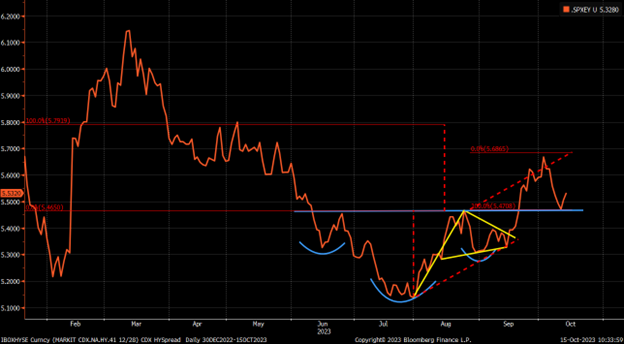
Sharp Drop in S&P 500 Cash Index
The break in the uptrend of the S&P 500, particularly following the sharp drop associated with the weak 30-year auction on Thursday afternoon, is a significant technical development. If this break in the uptrend is part of a larger pattern, it suggests a potential downside target of around 4,100. This level corresponds to a 100% extension of the price range from the September 14 high to the October 4 low. Moreover, it’s interesting to note that this projected level aligns nicely with a support level dating back to mid-May.
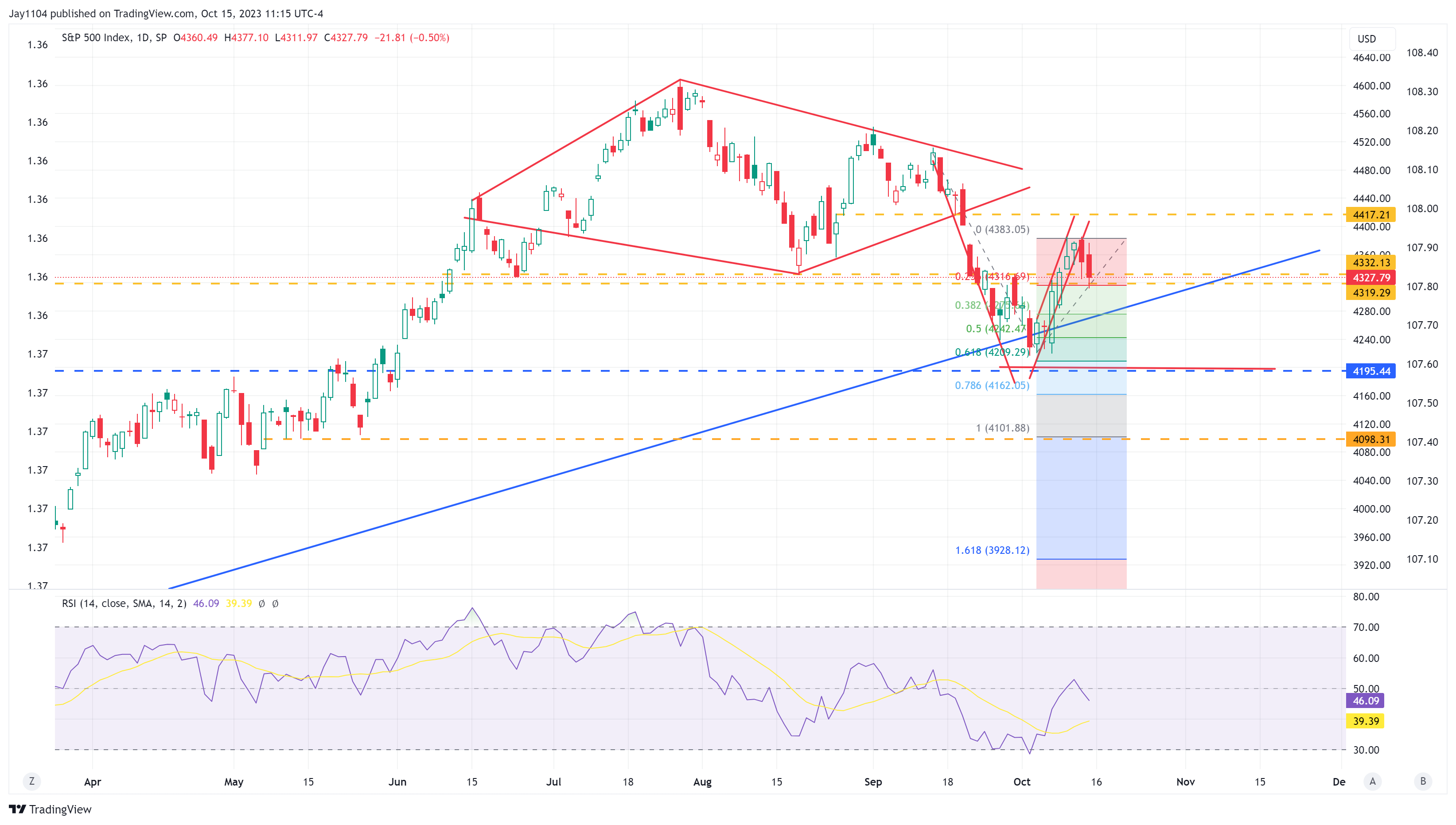
More this week.
